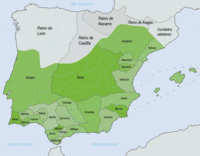Gharb al-Andalus: Difference between revisions
ShelfSkewed (talk | contribs) m fix isbn, rm notice |
No edit summary |
||
| Line 1: | Line 1: | ||
{{History of Portugal}} |
{{History of Portugal}} |
||
The '''Al-Gharb Al-Andalus''' ({{lang-ar|الأندلس لغرب}}, [[Arabic transliteration|trans.]] ''al- |
The '''Al-Gharb Al-Andalus''' ({{lang-ar|الأندلس لغرب}}, [[Arabic transliteration|trans.]] ''al-Gharb al-ʼAndalus''; "The [[West]] of [[Al-Andalus]]"), or just '''Al-Gharb''' ({{lang-ar|الغرب}}, [[Arabic transliteration|trans.]] ''al-Gharb''; "The West"), was the name given by the [[Moors]] of [[Iberian peninsula|Iberia]] to the modern region of [[Algarve]] and, by extension, to most of [[Portugal]], during their rule of the territory, from 711 to 1249. This period started with the fall of the [[Visigoths|Visigothic kingdom]] after [[Tariq ibn-Ziyad]]'s invasion of Iberia and the establishment of the [[Umayyad]] control in the territory. During this period of Muslim presence several scientific improvements were made, namely agricultural and astronomical. These areas would be vital for [[History of Portugal (1415–1578)|Portugal's 15th century expansion]]. The Gharb had a population of about 0.5 million people.<ref>{{cite book |
||
| last = Mattoso |
| last = Mattoso |
||
| first = José |
| first = José |
||
| Line 32: | Line 32: | ||
[[File:Almoravids1120.png|thumb|200px|left|Almoravid dynasty in 1120.]] |
[[File:Almoravids1120.png|thumb|200px|left|Almoravid dynasty in 1120.]] |
||
{{Main|Almoravid dynasty}} |
{{Main|Almoravid dynasty}} |
||
The Almoravid dynasty lasted from 1040 to 1147. During some of that time it ruled over what is now Southern Portugal. After a successful |
The Almoravid dynasty lasted from 1040 to 1147. During some of that time it ruled over what is now Southern Portugal. After a successful [[Siege of Lisbon|siege]], Portugal gained control of [[Lisbon]] in 1147. |
||
==Second taifa period== |
==Second taifa period== |
||
Revision as of 21:25, 25 October 2012
| History of Portugal |
|---|
 |
| Timeline |
|
|
The Al-Gharb Al-Andalus (Arabic: الأندلس لغرب, trans. al-Gharb al-ʼAndalus; "The West of Al-Andalus"), or just Al-Gharb (Arabic: الغرب, trans. al-Gharb; "The West"), was the name given by the Moors of Iberia to the modern region of Algarve and, by extension, to most of Portugal, during their rule of the territory, from 711 to 1249. This period started with the fall of the Visigothic kingdom after Tariq ibn-Ziyad's invasion of Iberia and the establishment of the Umayyad control in the territory. During this period of Muslim presence several scientific improvements were made, namely agricultural and astronomical. These areas would be vital for Portugal's 15th century expansion. The Gharb had a population of about 0.5 million people.[1]
Umayyad Conquest

After a small civil war in the already Christianized Visigothic Kingdom in Hispania, King Roderic (Rodrigo in Portuguese and Spanish) had a strong position in the peninsula. His opponents, exiled in Ceuta, asked Musa ibn Nusair, Umayyad Muslim governor and general, for help. The initially skeptical general sent an experimental expedition mainly consisting of Moors from North and West Africa, led by Tariq ibn Ziyad, thus initiating the Muslim conquest of Iberia. Tariq utterly defeated Roderic's Visigothic army in the Battle of Guadalete, and soon after captured Toledo and Córdoba. With Tariq's success, Musa joined the expedition and established himself as governor of the new territories.
By 714 Évora, Santarém and Coimbra had been conquered, and two years later Lisbon was in Muslim control. By 718 most of today's Portuguese territory was under Umayyad rule. The Umayyads were eventually stopped in Poitiers but the Muslim presence in Iberia would last until 1492 with the fall of the Kingdom of Granada.
Emirate and the Caliphate

The Emirate of Córdoba lasted from 756 to 929. The Caliphate of Córdoba lasted from 929 to 1031. It was followed by the Taifas.
First taifa period

The first Taifa of Badajoz, ruled by the Aftasid dynasty, existed from 1009 to 1094. The Taifa of Lisbon lasted from 1022 to 1093, when the city was conquered by Alfonso VI of León and Castile. The first Taifa of Mértola lasted from 1033 to 1044, when it became part of the Taifa of Seville. The Taifa of Santa Maria do Algarve lasted from 1018 to 1051, when it became part of the Taifa of Seville. The first Taifa of Silves lasted from 1040 to 1063, when it became part of the Taifa of Seville. The Taifa of Santarém lasted from 1044 to 1045, when it became part of the Taifa of Badajoz.
Almoravid dynasty

The Almoravid dynasty lasted from 1040 to 1147. During some of that time it ruled over what is now Southern Portugal. After a successful siege, Portugal gained control of Lisbon in 1147.
Second taifa period
There were three taifas in what is now Portugal after the fall of the Almoravid dynasty: the second Taifa of Mértola, which lasted from 1144 to 1151, the second Taifa of Silves, which lasted from 1144 to 1151 and the Taifa of Tavira which lasted from 1146 to 1150. All three taifas became part of the Almohad Caliphate in 1151.
Almohad Caliphate

The Almohad Caliphate lasted from 1121 to 1269. During much of this time, until 1249, it ruled much of what is now southern Portugal. In 1249 the Kingdom of Portugal conquered Faro.
References
- ^ Mattoso, José (1992). História de Portugal Primeiro Volume Antes de Portugal. História de Portugal. Círculo de Leitores. ISBN 972-42-0586-X.
See also
- Timeline of Portuguese history
- Timeline of the Muslim occupation of the Iberian Peninsula
- Reconquista
- Silves
